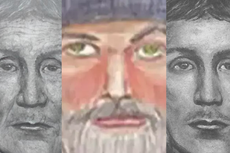Volunteer student genealogist helps solve cold case murder of nine-year-old girl nearly 60 years after killing
Nine-year-old Marise Ann Chiverella was found in a garbage dump on 18 March 1964, her murderer not identified for nearly 60 years
The abduction, rape and murder of a nine-year-old girl in a small Pennsylvania city left a community haunted for decades as the cold case went unsolved, without a single arrest being made, for nearly sixty years.
That was until recently, when the Pennsylvania state police announced in February that they’d successfully identified the long-dead assailant through the assistance of a young genealogy expert, who was just 18 when he was tapped by the force two years ago.
State police confirmed in a press conference that they were able to get a precise match of the killer, James Paul Forte, who they said was responsible for kidnapping Marise Ann Chiverella at some point along her 10-minute walk to school on 18 March 1964, sexually assaulting and strangling to death.
The little girl, whose parents had told authorities at the time of her disappearance had left for school early that morning to assist in delivering canned goods in honour of Feast Day at her Catholic school, was discovered later that day by a man driving along the road near a garbage dump who mistook her small frame as that of a large doll.
In the 57 years that Chiverella’s case remained open, more than 230 members of the department were involved in the probe at one point or another, amassing more than 4,700 pages in her file without securing a lead on the killer of the young girl who family members described as being shy with aspirations to become a nun.

That was until 2020, when college freshman Eric Schubert, who had taken up genealogical research mostly as a hobby while studying history at Elizabethtown College (about 80 miles outside of Hazleton), read about the Pennsylvania case that had gone dead in its tracks.
Mr Schubert had previously assisted law enforcement agencies map out family trees when they searched for suspects and thought his services might be of use in helping to find Chiverella’s killer.
“I just figured I’d send them an email and say, ‘I’d love to help if I’m not stepping on any toes, because I like to think I know what I’m doing,’” the Pennsylvania student told People.
After getting vetted by the lead investigator for the cold case, state police Corporal Mark Baron, the college student set to work, sometimes spending up to 20 hours a week, mapping out a network of possible suspects for close to 18 months.
“The investigation that went into all of this work was probably the hardest genealogy task that I’ve ever faced. This was probably the hardest thing that I’ve ever done in my entire life,” Mr Schubert told the Associated Press.
“It re-energised a lot of people and gave us new hope,” Cpl Baron told People. “Once we brought him on board, he didn’t stop.”
Eventually, the now 21-year-old made a break in the investigation, considered by the Pennsylvania force to be the oldest case in the state to be solved using genetic genealogy.

With the advent of new DNA technology that hadn’t been available at the time of Chiverella’s murder, plus Mr Schubert’s ability to zero-in on a likely suspect established from a distant family connection to Forte, the force was able to get approval to exhume the dead man’s body to test their theory.
After using a sample of DNA extracted from the nine-year-old’s clothing from the day she went missing, police were able to make a positive match to Forte on 3 February.
“The odds of the DNA not being his were one in something septillion,” Mr Schubert told People. “So that’s 24 zeros.”
Writing after the press conference, the 21-year-old expressed his extreme gratitude to the state police for allowing him have a role in helping solve the nearly six-decade-old cold case.
“Today was one of the most meaningful days of my life,” Mr Schubert wrote on Twitter. “I announced, with the @PAStatePolice, that we had solved the cold case homicide of Marise Ann Chiverella. So thankful I was able to help — Marise’s family now having answers is priceless to me. I will forever remember her.”
State police announced their findings at a conference shortly after the positive match was made through the young student’s detective work, the room packed with current and retired investigators who had worked the case, including the trooper who had first been assigned to Chiverella’s murder.
Family members, including the little girl’s four siblings, attended the briefing to hear how the cold case that had remained open for most of their lives was now being put to rest.
“We have so many precious memories of Marise. At the same time, our family will always feel the emptiness and sorrow of her absence,” Carmen Marie Radtke, one of the girl’s sisters, said to the Associated Press.
“Thanks to the Pennsylvania State Police just has been served today.”
The parents, however, were never able to get the closure that their children got. They died many years before the case was closed, but their kids’ told reporters at the press conference that they never sought revenge, but justice.
When speaking to the Associated Press after the conference, Cpl Baron noted what an important day it was to be able to put this case to rest, with Marise’s family there to witness it alongside their community.
“It’s a vivid memory for everybody who lived through this, and it’s a vivid memory for everybody who grew up in this area,” he said. “What happened to her ushered in a change in this community. Whether you like it or not, the way you lived changed after March 18, 1964 in Hazleton.”
This isn’t the first, nor will it likely be the last case, that the young geneologist is tapped by local law enforcement for his much sought after expertise.
Just recently, the volunteer crime solver received a special recognition award for his assistance in helping solve the 1982 cold case murder of Lee Rotatori from the Council Bluffs Police Department in Iowa, case that had remained open for nearly 40 years.



Bookmark popover
Removed from bookmarks